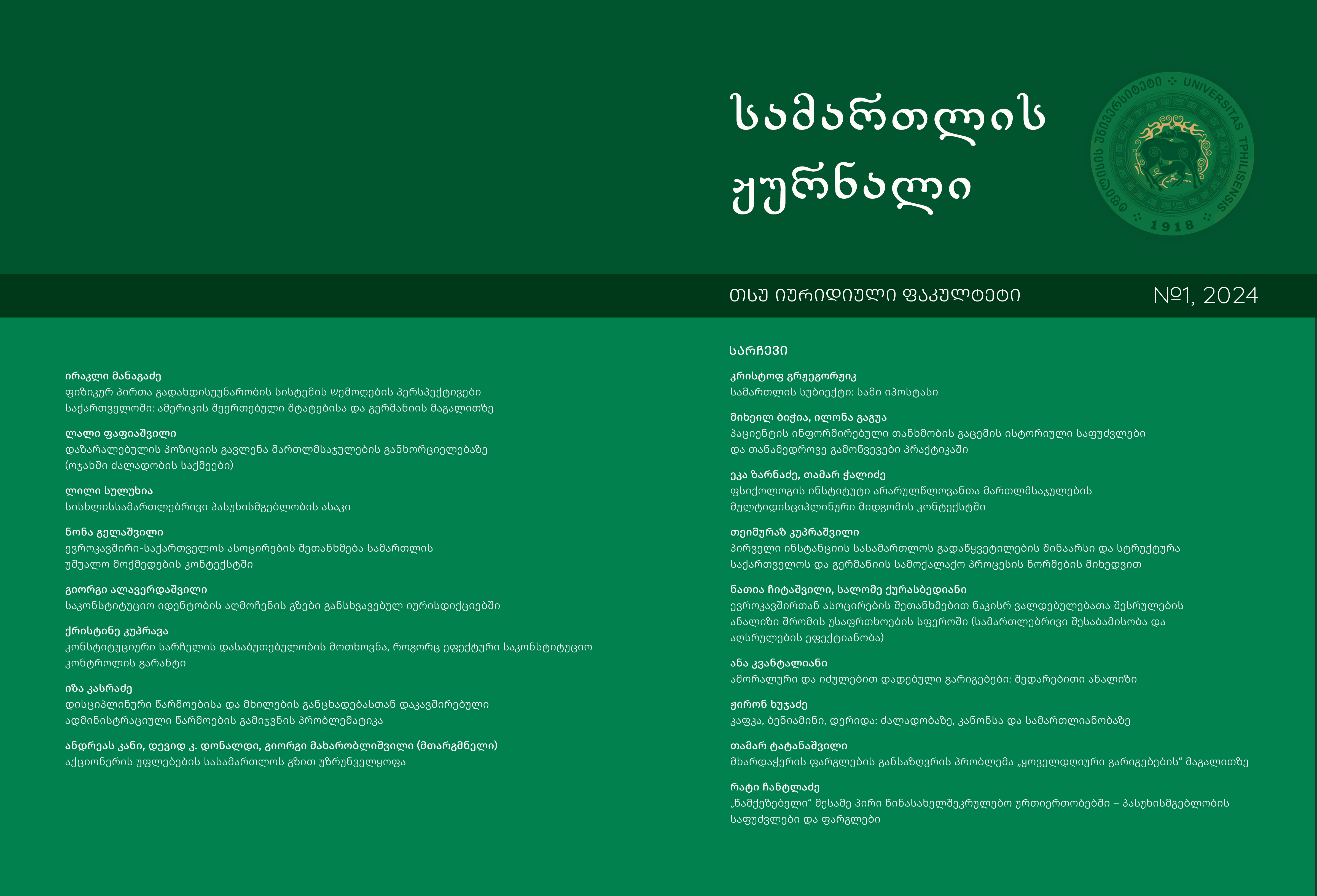საკონსტიტუციო იდენტობის აღმოჩენის გზები განსხვავებულ იურისდიქციებში
DOI:
https://doi.org/10.60131/jlaw.1.2024.7948საკვანძო სიტყვები:
საკონსტიტუციო იდენტობა, დაცული ნორმები, იდენტობის აღმოჩენის მოდელები, დამოუკიდებლობის დეკლარაცია, პრეამბულა.ანოტაცია
საკონსტიტუციო იდენტობებთან დაკავშირებით ლიტერატურაში განსხავებული პოზიციები არსებობს. ნაშრომში წარმოდგენილია ქართველი და უცხოელი პროფესორების მოსაზრებები, რომელთაგან ზოგიერთი ერთმანეთს ეწინააღმდეგება. სტატიის ძირითადი საკითხი ეხება საკონსტიტუციო იდენტობათა აღმოჩენის გზების გამოყოფას და კლასიფიკაციას. ავტორი მსჯელობს სხვადასხვა სახელმწიფოს მაგალითზე და სტატიაში წარმოადგენს საკონსტიტუციო იდენტობათა აღმოჩენის 4 განსხვავებულ მოდელს. პირველი მოდელის მიხედვით, საკონსტიტუციო იდენტობის აღმოჩენა შეიძლება კონსტიტუციის მიღმა არსებულ დოკუმენტში - დამოუკიდებლობის დეკლარაციაში. ამ მოდელის პრაქტიკულ მაგალითის ამერიკის შეერთებული შტატები წარმოადგენს. მეორე მოდელი გულისხმობს საკონსტიტუციო იდენტობის აღმოჩენას კონსტიტუციის შესავალ ნაწილში - პრეამბულაში. ამის მაგალითად განხილულია თურქეთი. მესამე მოდელით საკონსტიტუციო იდენტობის ამოკითხვა უშუალოდ კონსტიტუციის ტექსტში შეიძლება. ამ შემთხვევაში ორი ქვეტიპის გამოყოფა შეიძლება. ერთ შემთხვევაში, კონსტიტუციის ჩვეულებრივმა ნორმამ შეიძლება იტვირთოს იდენტობის ფუნქცია, ხოლო მეორე შემთხვევაში კი ამას მუდმივი ნორმა აკეთებს. თითოეულ შემთხვევაზე მოყვანილია შესაბამისი სახელმწიფოს მაგალითი. საკონსტიტუციო იდენტობის აღმოჩენის მეოთხე მოდელი გულისხმობს სასამართლო გადაწყვეტილებების გზით იდენტობის ამოკითხვას.
სტატიაში კრიტიკულად არის გააზრებული უცვლელი ნორმების მიერ საკონსტიტუციო იდენტობის გამოხატვა. კერძოდ, შესაბამისი არგუმენტების წარმოდგენით ავტორი მსჯელობს, რომ ყველა შემთხვევაში დაცული ნორმა ვერ იქნება იდენტობის გამომხატველი. ამიტომ, სტატიაში შემოთავაზებულია ერთგვარი ფორმულა, რომლის გამოყენების შემთხვევაშიც ნათელი გახდება, თუ კონკრეტულად როდის შეიძლება იტვირთოს უცვლელმა ნორმამ საკონსტიტუციო იდენტობის ფუნქცია. ამ ფორმულის პრაქტიკული დანიშნულების ილუსტრირებისთვის სტატიაში განხილულია შესაბამისი მაგალითები.
წყაროები
Gegenava D., For Understanding Constitutional Identities, in Sergo Jorbenadze 90, edited by Sergi Jorbenadze, Sulkhan-Saba University Press, 2019, 335, 339 (in Georgian).
Basic Law of Germany, 08/05/1949.
Constitution of Norway, 17/05/1814.
Albert R., Constitutional Amendment and Dismemberment, The Yale Journal of International Law, Vol. 43, 2018, 39.
Albert R., Constitutional Amendments, Making, Breaking, and Changing Constitutions, Oxford University Press, 2019, 68, 85, 139.
Chandra A., A Precious Heritage?: the Construction of Constitutional Identity by Indian Courts, Comparative Constitutional Studies, Vol. 1 N. 1, Edward Elgar Publishing, 2023, 140-142, 144.
Dixon R., Amending Constitutional Identity, Cardozo Law Review, Vol. 33, № 5, 2012, 1847-1858.
Ginsburg T., Bisaraya S., Introduction, Constitution Makers on Constitution Making, New Cases, Cambridge University Press, 2022, 25.
Ginsburg T., Democracies and International Law, Cambridge University Press, 2021, 108.
Friedman A., Dead Hand Constitutionalism: the Danger of Eternity Clauses in New Democracies, Mexican Law Review, Vol. 4, №1, 2011, 79.
German Political Parties, https://www.britannica.com/place/Germany/Political-process [10.11.23.].
Jackson V., What's in a Name? Reflections on Timing, Naming, and Constitution-making, William & Mary Law Review, Vol. 49, Iss. 4, 2008, 1253.
Jacobson G., Constitutional Identity, Harvard University Press, 2010, 88, 329, 349.
Jacobson G. J., Rights and American Constitutional Identity, Polity, Vol. 43, №. 4, 2011, 414, 428.
Jacobson G., The Formation of Constitutional Identities, Comparative Constitutional Law, edited by Tom Ginsburg and Rosalind Dixon, Edward Edgars Publishing, 2011, 129, 131, 132.
Krunke H., Constitutional Identity and Equality: the Challenge of the Nordic EU Member States, Comparative Constitutional Studies, Vol. 1 N. 1, Edward Elgar Publishing, 2023, 126.
Landau D., Dixon R., Tiered Constitutional Design, The George Washington Law Review, Vol. 86, 2018, 486.
Landau D., Presidential Term Limits in Latin America: A Critical Analysis of the Migration of the Unconstitutional Constitutional Amendment Doctrine, Law & Ethics of Human Rights, Vol. 12, № 2, 2018, 242.
Landau D., Roznai Y., Dixon R., Term Limits and the Unconstitutional Constitutional Amendment Doctrine: Lessons from Latin America, The Politics of Presidential Term Limits, edited by Alexander Baturo and Robert Elgie, Oxford University Press, 2019, 63-64.
Michel S., Cofone I.N., Credible Commitment or Paternalism? The Case of Unamendability, An Unamendable Constitution? Unamendability in Constitutional Democracies, Springer International Publishing AG, 2018, 137.
Rosenfeld M., The Identity of the Constitutional Subject: Selfhood, Citizenship, Culture and Community, Routledge, 2010, 29, 131, 187, 195.
Roznai Y., Internally Imposed Constitutions, The Law and Legitimacy of Imposed Constitutions, edited by Richard Albert, Xenophon Contiades and Alkmene Fotiadou, Routledge, 2019, 61-62.
Roznai Y., Okubasu D. M., Stability of Constitutional Structures and Identity Amidst ‘Political Settlement’: Lessons from Kenya and Israel, Comparative Constitutional Studies, Vol. 1 N. 1, Edward Elgar Publishing, 2023, 122.
Roznai Y., The Straw that Broke the Constitution’s Back? Qualitative Quantity in Judicial Review of Constitutional Amendments, Constitutionalism: Old Dilemmas, New Insights, edited by Alejandro Linares Cantillo, Oxford University Press, 2021, 149.
Roznai Y., Unamendability and the Genetic Code of the Constitution, European Review of Public Law, Vol. 27, Iss. 2, 2015, 775-824.
Roznai Y., Unconstitutional Constitutional Amendments: the Limits of Amendment Powers, Oxford University Press, 2017, 142, 148.
Sajó A., Fabbrini F., The Dangers of Constitutional Identity, European Law Journal, Vol. 25, Iss. 4, 2019, 471.
Sajó A., Uitz R., The Constitution of Freedom: an Introduction to Legal Constitutionalism, Oxford University Press, 2017, 64-65.
Scholtes J., Abusing Constitutional Identity, German Law Journal, Vol. 22, 2021, 534–556.
Suteu S., Eternity Clauses in Democratic Constitutionalism, Oxford University Press, 2021, 113-121.
Versteeg M., Horley T., Meng A., Guim M., Guirguis M., The Law and Politics of Presidential Term Limit Evasion, Columbia Law Review, Vol. 120, 2020, 231-232.
ჩამოტვირთვები
გამოქვეყნებული
როგორ უნდა ციტირება
გამოცემა
სექცია
ლიცენზია

ეს ნამუშევარი ლიცენზირებულია Creative Commons Attribution-ShareAlike 4.0 საერთაშორისო ლიცენზიით .









